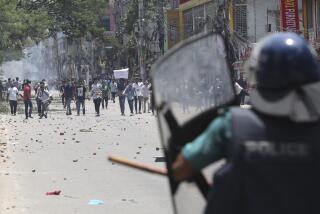Bangkok clashes rage on; death toll hits 17
BANGKOK, Thailand — Fighting in Bangkok continued for a third day Saturday with the death toll mounting to 17 as Thai troops fired live rounds in a bid to contain and isolate anti-government protesters encamped in a glitzy shopping district.
With 150 wounded in recent days, the army issued a warning Saturday that the riot-hit neighborhood was now a “live firing zone,” as soldiers took cover behind sandbags and on rooftops.
Demonstrators faced them down behind barriers, wielding petrol bombs, stones, guns and homemade rockets, and vowed to maintain a siege that has already lasted two months.
Dawn broke Saturday morning after a long night of grenade explosions and sporadic gunfire. The army has been trying to set up a perimeter around the mile-square barricaded area that several thousand protesters have refused to leave.
The protesters, known as “ Red Shirts,” have demanded that Prime Minister Abhisit Vejjajiva resign, call immediate elections and leave the country. Most are from poor, farmer and working class communities and believe the government is illegitimate.
Earlier, power and water were cut as troops surrounded the besieged area and set up razor-wire check points to prevent more protesters from entering. That’s left the rag-tag masses scrambling for generators, food and bottled water.
Any thoughts the army might have to storm the area have been complicated by the layout, a desire to look reasonable and the presence of women and children whose death would present a public relations disaster.
“People are saying the protesters have had ample time to leave,” said David Tuck, Bangkok-based research director with Spectrum OSO Asia, a risk analysis firm. “But no prime minister wants to have blood on his hands.”
The crisis has paralyzed parts of Bangkok, closing down Bangkok’s sky train, embassies and downtown businesses, hurting the region’s second-largest economy and scaring off the vital tourist trade in one of Asia’s most promising emerging markets.
Thailand is no stranger to political unrest, having seen 18 constitutions, 27 prime ministers and a spate of violent demonstrations since the start of constitutional monarchy in 1932.
Tanyarat Pongtaweewirat, owner of Bangkok’s Wild Orchid Villa guest house, said she has spent the past two months trying to persuade tourists to come to Bangkok. “I tell them that if they want to go sightseeing, it’s safe for them,” she said. “I just tell them not to go to downtown.”
But that’s not likely to convince travelers watching televised images from afar of machine-gun toting soldiers racing past jewelry stores and ATM machines as tires burn, pedestrians dive for cover and bullets ricochet off roadways.
As the violence has spiraled out of control, foreign voices have called for calm. U.N. Secretary-General Ban Ki-Moon expressed concern over “the rapidly mounting tensions and violence,” and the Canadian government has called on both sides to return to negotiations after a Canadian journalist was shot repeatedly Friday.
The latest violence erupted Thursday after a former Thai general and Red Shirts military strategist was shot and seriously injured, apparently by a sharpshooter, as he spoke to the foreign media.
The protesters claim Abhisit’s coalition government came to power by manipulating the courts and with the backing of the powerful military.
Thaksin Shinawatra, a populist premier who enjoys broad support among Red Shirts, was forced from office by the military in a 2006 coup. Two subsequent pro-Thaksin governments were disbanded by court rulings before Abhisit became prime minister.
Last week, Abhisit offered to hold elections in November as part of a “reconciliation plan,” but Red Shirt leaders immediately upped their demands and talks fell apart.
“The problem is that, after the reconciliation plan, Abhisit has no plan B,” said Michael Montesano, visiting research fellow with the National University of Singapore’s Institute of Southeast Asian Studies.
What’s clear, most analysts say, is that the turmoil is unlikely to end any time soon.
my-thuan.tran@latimes.com
mark.magnier@latimes.com
More to Read
Sign up for Essential California
The most important California stories and recommendations in your inbox every morning.
You may occasionally receive promotional content from the Los Angeles Times.









